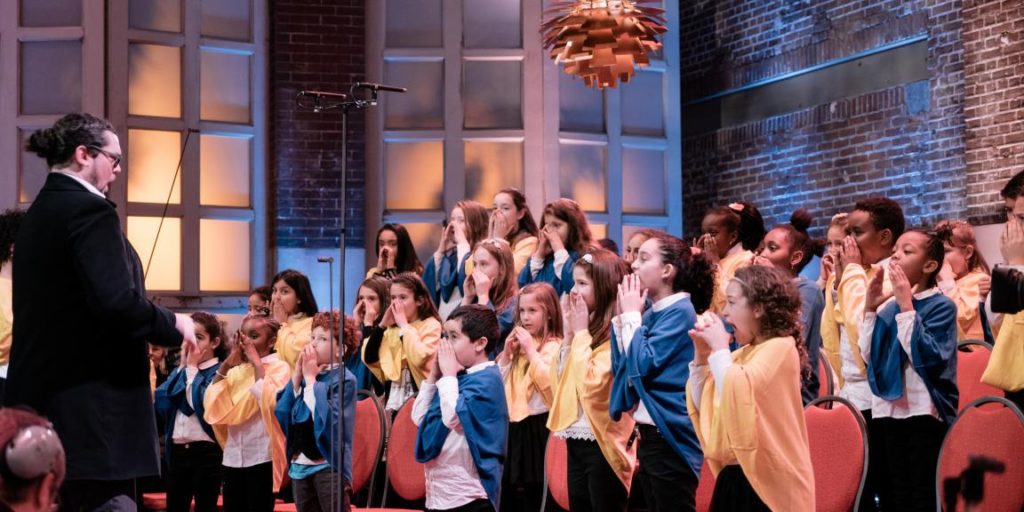As September and the start of a new school year begins, the time seems right to reflect on a subject that is dramatically absent from the curriculum: music. Music hardly plays any role of importance in our educational system. It is seen as a kind of hobby, something a minority of children who want it – or whose parents want it – can learn when school is over or on a Wednesday afternoon or Saturday morning.
However, music, which is so important to who we are as human beings and to our personal development, should not be looked at as an addition but should be considered an essential part of our education. Music should not be something some children learn after school. It should be studied by all children during the regular school hours.
Music is all around
To most of us, music is a vibrant part of life. There isn’t a day that goes by without us coming into contact with music. In today’s world we hear music everywhere, all the time: while we’re waiting for the metro, in shopping malls, in the elevator at the hospital, in the chair of the dentist or in a bar. On top of that, we live in times in which music is easily available. Many of us constantly carry our favourite music in our pockets.
You don’t have to go to a concert hall to hear your favourite band or an opera. Just a simple search on Spotify or YouTube, and you can enjoy any music anywhere you want it and when you want. One could easily be tempted into thinking that this availability would result in an increased understanding and appreciation of music, but this might not be the case. And the absence of proper musical education in our schools is proof of that.
Declining quality
According to a recent report by the Flemish Inspectorate of Education, the quality of musical education in primary schools in Flanders is rapidly decreasing. The main issue is the fact that teachers themselves don’t have the sufficient knowledge and knack for music in order to teach it. Hilde Crevits, Flemish Minister of Education, stated that she hopes to be able to tackle the issue by increasing the collaboration between our schools and music academies. But perhaps it is time to thoroughly rethink the place of music in our system of education, altogether.
A Trained Brain
The benefits of musical education are plenty. Through music, we can develop important sensory motor and cognitive skills. Learning music has a proven effect on our language skills, on our abilities to focus and concentrate and to absorb and retain information. Music is an all-round exercise that keeps the brain fit. Especially the ability to concentrate, which seems as important today as ever, because we live in times of distraction. There is so much going on in the world around us. We are constantly surrounded by things that cry out for our attention. A brain that has been thoroughly challenged and trained is better able to resist all those temptations that make concentration and creativity impossible.
Interpersonal skills
What is perhaps most important to musical education, is not its effect on our cognitive, but on our interpersonal skills. Through music, we can develop a better understanding of others. Listening to music, really listening, is not a passive, receptive pastime. Music is involvement with, and insight in the inner lives of others. It is a dialogue, and a dialogue is a means to get to know the other, to develop our understanding of each other and to sympathize with each other.
Music doesn’t have to be packed with sadness and suffering to address and cultivate our ability to feel for others. Even simple nursery rhymes do this: they invite us to listen to what the other has to say, they make us familiar with a perspective that is not ours. That is why, already at a very early stage of development, music is of the greatest importance in our personal and moral development.
Individual initiatives
As a substantial approach is lacking, all too often musical education relies on personal and private initiatives, such as the truly unique Molenbeek Kid’s Choir. The choir is led by Zeno Popescu and accompanied by Julien Libeer, one of Belgium’s best young pianists. They visit several schools to practice during lunch break. It is an ambitious project since the choir unites children from very different and often difficult backgrounds. But the outcome has been impressive. Singing gives those children the opportunity, quite literally, to use their voice; they feel they are being heard, and they learn to listen.
Those children begin to perform better at school, and it helps them to connect with each other. Even their parents are more connected to each other and the world outside. This Brussels-based choir can be seen as a beautiful example of the social and personal importance of music and shows why music should play a much more central role in our education.
Becoming who you are
This is also a lesson I learned from personal experience. In 1988, we fled from communist Poland and settled in Belgium. Already in the first months after our arrival in Belgium, my parents enrolled me and my sisters in a local choir. Perhaps no decision has proven to be as conducive to our integration as this one. Singing in a children’s choir provided us with a sense of togetherness and belonging, and a feeling of self-worth, even at a time when we found ourselves right at the bottom of the social ladder and struggling with learning the new language, and all the other difficulties you face when you settle in a place that is completely new.
There I experienced what a great emancipatory and unifying force music is, and why learning music and making music together is so important. It is not about becoming a musician, it is about growing as a human being and becoming who you are.
By Alicja Gescinska


